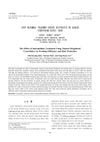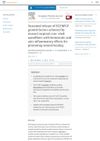![Synthesis and In Vitro Study of 17β-[N-Ureylene-N,N′-Disubstituted]-4-Methyl-4-Aza-5α-Androstan-3-Ones as Selective Inhibitors of Type I 5α-Reductase](/images/research/d19df8a7-8de6-4430-8a0d-4ffa1f502985/small/15608.jpg) 5 citations,
February 1997 in “Bioorganic & Medicinal Chemistry”
5 citations,
February 1997 in “Bioorganic & Medicinal Chemistry” New compounds were made that effectively block a specific enzyme related to androgen conditions.
 3 citations,
January 2009 in “Sen'i Gakkaishi”
3 citations,
January 2009 in “Sen'i Gakkaishi” Using both TGA and DTDG in hair straightening reduces hair damage compared to using TGA alone.
 March 2024 in “Journal of Pharmaceutical and Sciences”
March 2024 in “Journal of Pharmaceutical and Sciences” Zaleya pentandra extracts, especially acetone, may be useful for new medicines and food industry applications.
 August 2021 in “Han'gug miyong haghoeji/Journal of the Korean society of cosmetology”
August 2021 in “Han'gug miyong haghoeji/Journal of the Korean society of cosmetology” Using natural polyphenol cross-linkers like tannic acid and green tea extract in perm treatments improves curling and protects hair.
 February 2020 in “International research journal of pharmacy”
February 2020 in “International research journal of pharmacy” The emulsion made from tea plant and onion extracts shows promise for treating hair loss.
 December 2023 in “ACS Sustainable Chemistry & Engineering”
December 2023 in “ACS Sustainable Chemistry & Engineering” Keratin can be successfully taken from human hair using a mix of choline chloride and ethanolamine.
 November 2024 in “Polymers for Advanced Technologies”
November 2024 in “Polymers for Advanced Technologies” The hydrogel effectively heals wounds and kills bacteria.
September 2022 in “International Journal of Science and Research (IJSR)” The F3 pumpkin seed oil gel showed excellent properties and better drug release for hair loss treatment.
 8 citations,
January 2023 in “Biosensors”
8 citations,
January 2023 in “Biosensors” Piezoelectric Nanogenerators are promising for non-invasive health monitoring but need efficiency and durability improvements.
 5 citations,
May 2022 in “Biomedicines”
5 citations,
May 2022 in “Biomedicines” Botryococcus terribilis and its compounds may promote hair growth and improve hair health.
 2 citations,
March 2023 in “European Polymer Journal”
2 citations,
March 2023 in “European Polymer Journal” The new nanofiber improves wound healing by releasing growth factors, reducing inflammation, and helping skin regeneration.
2 citations,
January 2019 in “Asian journal of pharmaceutical and clinical research” Amla is a natural remedy with many health benefits, including antiviral and antibacterial properties.
2 citations,
January 2016 in “Advanced biomedical research” The hair wax with propolis and Eruca sativa seed oil promotes hair growth effectively.
 1 citations,
September 2023 in “International Journal of Biological Macromolecules”
1 citations,
September 2023 in “International Journal of Biological Macromolecules” The hydrogel made from plant polysaccharide and gelatin helps wounds heal faster by absorbing fluids and maintaining a moist healing environment.
 May 2024 in “Chemical engineering journal”
May 2024 in “Chemical engineering journal” New treatment using Minoxidil and EGCG with ionic liquids improves hair growth and quality for hair loss.
 March 2024 in “Advanced science”
March 2024 in “Advanced science” A new hydrogel made from human cells improves wound healing by working with immune cells to promote repair.
 December 2023 in “International Journal of Biological Macromolecules”
December 2023 in “International Journal of Biological Macromolecules” Chitosan nanoparticles loaded with Minoxidil were effective for hair growth but released the drug more slowly than the amphiphilic derivative.
 September 2023 in “Journal of Natural Fibers”
September 2023 in “Journal of Natural Fibers” Drying hair with a microfiber towel better maintains hair strength and structure than using a cotton towel or blow-drier.
 88 citations,
February 2008 in “Journal of Medicinal Chemistry”
88 citations,
February 2008 in “Journal of Medicinal Chemistry” Scientists made the first metal-based compounds from a nonsteroidal antiandrogen drug, which showed potential in fighting both hormone-dependent and independent prostate cancer cells.
 13 citations,
November 2015 in “Blood Pressure”
13 citations,
November 2015 in “Blood Pressure” Hair loss may indicate higher heart risk and metabolic issues.
 4 citations,
August 2016 in “Australasian Journal of Dermatology”
4 citations,
August 2016 in “Australasian Journal of Dermatology” Hair loss is linked to insulin resistance in women, regardless of hormone levels.
 24 citations,
November 2015 in “Annals of Nutrition and Metabolism”
24 citations,
November 2015 in “Annals of Nutrition and Metabolism” Certain SHBG gene variants, like rs727428, are linked to higher testosterone levels in women with PCOS.
 19 citations,
January 2017 in “Hormone Molecular Biology and Clinical Investigation”
19 citations,
January 2017 in “Hormone Molecular Biology and Clinical Investigation” High levels of male hormones are very common in women with PCOS and affect their metabolism differently depending on their weight.
 13 citations,
March 2019 in “Physiological Research”
13 citations,
March 2019 in “Physiological Research” Overweight women with PCOS have higher levels of certain hormones that could indicate a higher risk of heart and metabolic problems.
 46 citations,
June 2015 in “Fertility and Sterility”
46 citations,
June 2015 in “Fertility and Sterility” Insulin resistance is significantly linked to a higher risk of depression in women with PCOS.
 42 citations,
July 2017 in “Scientific Reports”
42 citations,
July 2017 in “Scientific Reports” Women with PCOS are more likely to have insulin resistance and obesity, especially those with the most severe type I PCOS.
 18 citations,
May 2017 in “Fertility Research and Practice”
18 citations,
May 2017 in “Fertility Research and Practice” Larger ovarian size is linked to higher insulin resistance in women with PCOS.
 14 citations,
February 2016 in “Journal of Obstetrics and Gynaecology Research”
14 citations,
February 2016 in “Journal of Obstetrics and Gynaecology Research” Blood tests are needed to confirm high male hormone levels in women with PCOS, as physical signs alone are not reliable.
 5 citations,
October 2018 in “Journal of Clinical Laboratory Analysis”
5 citations,
October 2018 in “Journal of Clinical Laboratory Analysis” Women with PCOS who have high male hormone levels often also have insulin resistance.
 1 citations,
April 2021 in “Deneysel ve klinik tıp dergisi/Journal of experimental and clinical medicine”
1 citations,
April 2021 in “Deneysel ve klinik tıp dergisi/Journal of experimental and clinical medicine” Women with PCOS have a higher risk of metabolic syndrome and need lifestyle changes and treatment.
![Synthesis and In Vitro Study of 17β-[N-Ureylene-N,N′-Disubstituted]-4-Methyl-4-Aza-5α-Androstan-3-Ones as Selective Inhibitors of Type I 5α-Reductase](/images/research/d19df8a7-8de6-4430-8a0d-4ffa1f502985/small/15608.jpg)

























